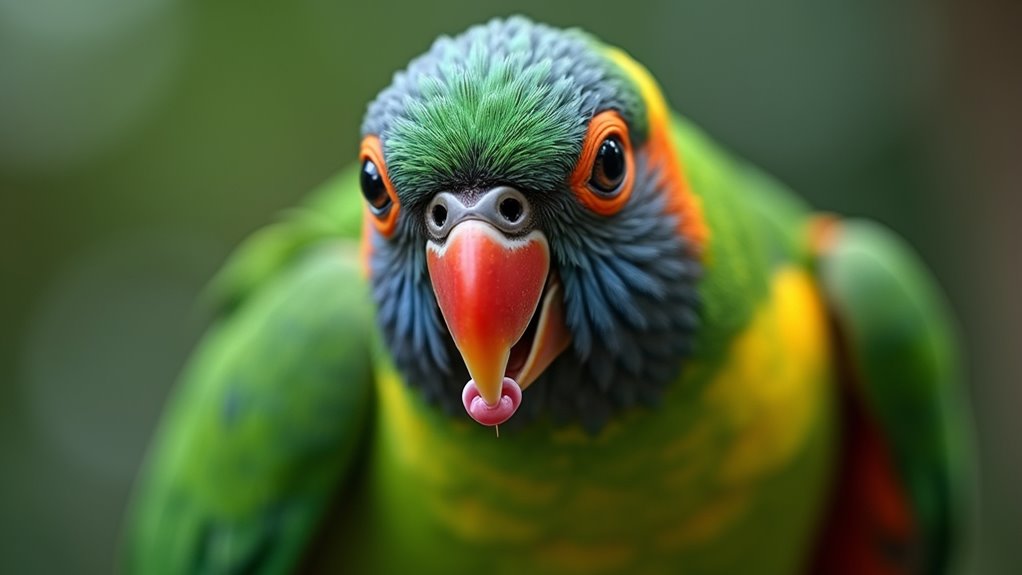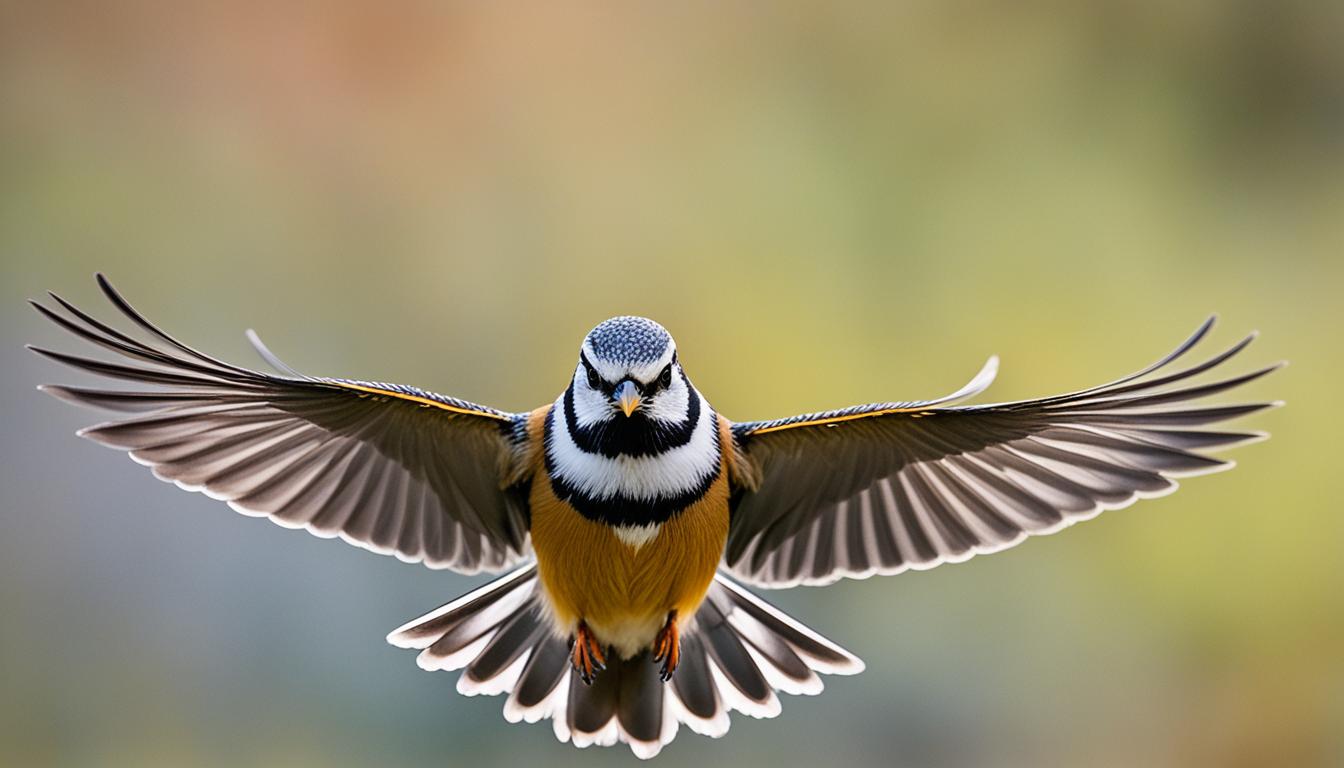Your bird might be biting because it’s trying to communicate that it feels threatened, overstimulated, or uncomfortable. Body language cues like fluffed feathers, pinched eyes, or moving away are signals that your bird needs space. Sometimes, biting happens when it’s stressed or unsure about handling. Paying attention to these signs and respecting your bird’s boundaries helps reduce bites. If you want to understand more about what causes biting and how to prevent it, keep exploring these behaviors.
Key Takeaways
- Birds often bite to communicate feeling threatened, overstimulated, or defending their territory or resources.
- Fluffed feathers, pinched eyes, or hissing indicate the bird is uncomfortable and may bite if approached.
- Sudden movements or rough handling can trigger defensive bites as a stress response.
- Biting can be a sign of fear or a desire to establish boundaries during interaction.
- Proper socialization, gentle handling, and reading body language reduce biting behavior and build trust.

Have you ever wondered why some birds bite? It’s a common question among bird owners, and understanding the reasons behind this behavior can help you build a stronger bond with your feathered friend. One of the first things to consider is bird body language. Birds communicate a lot through their posture, feathers, and eye contact. For example, if your bird fluffs up its feathers, hisses, or pinpoints its eyes, it’s often a sign that it feels threatened or uncomfortable. Recognizing these signals can help you interpret whether your bird is trying to tell you to back off or if it’s simply feeling anxious. When you pay close attention to bird body language, you can adjust your handling techniques to make your bird feel safer and more at ease. Gentle, slow movements tend to reduce stress, whereas sudden or rough handling can trigger defensive bites. Additionally, understanding your bird’s behavioral cues can help prevent misunderstandings and foster trust. When handling your bird, keep your movements deliberate and gentle, and pay attention to its reactions. If your bird tenses up or tries to move away, respect its boundaries and give it time to relax. Over time, consistent, positive handling techniques can help your bird associate your touch with safety and comfort, reducing the likelihood of biting out of fear or irritation. It’s vital to understand that biting isn’t always about aggression; often, it’s a form of communication. Birds might bite if they’re feeling overwhelmed, overstimulated, or if they’re trying to protect their territory or resources. Recognizing early warning signs and observing their body language can prevent bites before they happen. Understanding the neurobiological factors involved in bird behavior can also provide insight into their triggers for biting. Creating a calm environment and proper socialization can significantly decrease biting incidents by helping your bird feel more secure. Proper handling and socialization play crucial roles in reducing biting and building trust. By observing their body language and adjusting your handling techniques accordingly, you can create a more trusting environment. Don’t force interactions if your bird shows signs of discomfort, and instead, give it space to approach you when it’s ready. Patience and gentle handling build confidence and reduce stress, which in turn minimizes biting episodes. Remember, every bird is unique, and understanding their body language and learning proper handling techniques will help you develop a more harmonious relationship based on mutual respect and trust.
Frequently Asked Questions
How Can I Tell if My Bird’s Biting Is Aggressive or Playful?
To tell if your bird’s biting is aggressive or playful, observe its body language cues, vocalizations, and sounds. If your bird puffs up, hisses, or fluffs its feathers, it’s likely aggressive. Playful bites are usually gentle, paired with relaxed body language, chirping, or soft vocalizations. A happy, curious bird often interacts with gentle bites, while aggressive behavior involves stiff posture and louder, sharper sounds.
Are Certain Bird Breeds More Prone to Biting Than Others?
Certain bird breeds do tend to be more prone to biting due to breed tendencies and biting genetics. For example, some parrots like Amazon and African Grey parrots may bite more often because of their natural instincts and social behaviors. However, individual temperament and training play a significant role. You should observe your bird’s behavior closely and provide proper socialization to reduce biting, regardless of breed.
How Does My Bird’s Environment Influence Its Biting Behavior?
Your bird’s environment greatly impacts its biting habits. A cramped bird enclosure or poor cage placement can cause stress, making your bird more prone to biting. Make certain the cage is spacious and placed in a quiet, safe area where your bird feels secure. Regularly change the environment, provide enrichment, and avoid sudden movements, helping reduce stress and behavioral issues like biting.
Can Diet or Health Issues Cause Increased Biting in My Bird?
Your bird’s diet and health concerns can definitely cause increased biting. If your bird isn’t getting proper nutrition, it might become more irritable or defensive, leading to biting. Health issues like pain or discomfort also make your bird more likely to bite as a way to protect itself. Make sure you provide a balanced bird diet and visit an avian vet regularly to address any health concerns that could be influencing its behavior.
What Are Effective Ways to Train My Bird Not to Bite?
Did you know that consistent training can reduce biting by up to 80%? To stop your bird from biting, use positive reinforcement—praise and treats when it behaves well. Set clear, consistent boundaries, so your bird knows what’s acceptable. Avoid punishment; instead, redirect biting behavior to appropriate toys. Patience is key. Over time, your bird learns gentle interaction, strengthening your bond and reducing biting incidents considerably.
Conclusion
Remember, your bird’s bites are like whispers of its soul, telling you what it needs or fears. By listening carefully, you can help build trust and turn that sharp edge into a gentle song. Just as a seed holds the promise of growth, understanding transforms bites into bonds. Patience and compassion are your keys—unlock the deeper language of your feathered friend, and watch your bond blossom into a beautiful, shared harmony.










